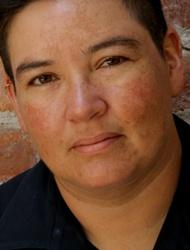Marcia Ochoa
Marcia Ochoa | |
|---|---|
 Marcia Ochoa | |
| Born | 9 September 1970 |
| Known for | Latino Studies, Transgender studies, Queer theory, Ethnography, "Perverse Citizenship"[1] |
| Academic background | |
| Alma mater | Stanford University (Ph.D.)[2] |
| Doctoral advisor | Purnima Mankekar and Renato Rosaldo |
| Academic work | |
| Institutions | University of California, Santa Cruz Stanford University |
Marcia Ochoa (born 9 September 1970) is a United States-based professor of Feminist Studies and Critical Race and Ethnic Studies at the University of California, Santa Cruz.[3] They are the co-founder of El/La Para TransLatinas and is credited with popularizing the term "translatina."[4]
Life[]
Ochoa moved to San Francisco in 1994.[5] They co-founded El/La Para TransLatinas in 2006 in San Francisco, California.[6]
Career[]
Ochoa completed her Ph.D. at Stanford University in Anthropology in 2005.[7] She began teaching at the University of California, Santa Cruz in 2005, chaired the Feminist Studies department from 2014-17, and currently serves as Provost of Oakes College. She is also a professor of Critical Race and Ethnic Studies, Social Documentation, Anthropology, Latin American & Latino Studies, and Film and Digital Media.[3]
She published her first book based on her dissertation, Queen for a Day: Transformistas, Beauty Queens and the Performance of Femininity in Venezuela, in 2014 through Duke University Press.[8] It was nominated for a Lambda Literary Award.[9] That same year, she edited the Transgender Studies Quarterly issue "Decolonizing the Transgender Imaginary".[10] She is currently the editor of GLQ: A Journal of Lesbian and Gay Studies.[11][12]
Following the publication of Queen for a Day, Ochoa's work focused on early colonial violence in Latin America.[13]
References[]
- ^ Ochoa, Marcia (2008-12-14). "Perverse Citizenship: Divas, Marginality, and Participation in "Loca-Lization"". WSQ: Women's Studies Quarterly. 36 (3): 146–169. doi:10.1353/wsq.0.0102. ISSN 1934-1520. S2CID 85321671.
- ^ Asencio, Marysol (2009). Latina/o Sexualities: Probing Powers, Passions, Practices, and Policies. Rutgers, NJ: Rutgers University Press.
- ^ Jump up to: a b "Marcia Ochoa". lals.ucsc.edu. Retrieved 2018-01-13.
- ^ Miguel, Yolanda Martínez-San, and Sarah Tobias. Trans Studies: The Challenge to Hetero/Homo Normativities. Rutgers University Press, 2016.
- ^ "Marcia Ochoa | OUT/LOOK & the Birth of the Queer". OUT/LOOK & the Birth of the Queer. Retrieved 2018-01-13.
- ^ "El/La Para TransLatinas". ellaparatranslatinas.yolasite.com. Retrieved 2018-01-13.
- ^ Ochoa, Marcia (2014). Queen for a day: Transformistas, Misses and Mass Media in Venezuela. Stanford, CA: Stanford University.
- ^ Ochoa, Marcia (2014). Queen for a Day: Transformistas, Beauty Queens, and the Performance of Femininity in Venezuela. Durham, NC: Duke University Press.
- ^ Kellogg, Carolyn (2015-06-02). "Lambda Literary Awards laud best gay, lesbian and transgender books". Los Angeles Times. ISSN 0458-3035. Retrieved 2018-01-13.
- ^ Aizura, Aren Z.; Ochoa, Marcia; Cotton, Trystan; Vidal-Ortiz, Salvador (2014). Decolonizing the Transgender Imaginary. ISBN 978-0822368175.
- ^ "GLQ | Duke University Press". read.dukeupress.edu. Retrieved 2018-01-13.
- ^ "An Interview with Marcia Ochoa: How She Envisions the Future of GLQ". Duke University Press News. 2015-06-25. Retrieved 2018-01-13.
- ^ "Los Huecos Negros: Cannibalism, Sodomy and the Failure of Modernity in Tierra Firme | Genders | University of Colorado Boulder". www.colorado.edu. Retrieved 2018-01-13.
- Feminist studies scholars
- University of California, Santa Cruz faculty
- Stanford University alumni
- Academic journal editors
- 1970 births
- Living people